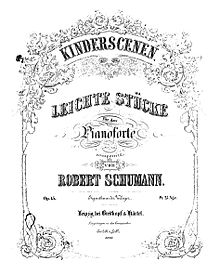Loading AI tools
Composition for piano by Robert Schumann From Wikipedia, the free encyclopedia
Kinderszenen[lower-alpha 1] (German pronunciation: [ˈkɪndɐˌst͡seːnən], "Scenes from Childhood"), Op. 15, by Robert Schumann, is a set of thirteen pieces of music for piano written in 1838.
| Kinderszenen | |
|---|---|
| by Robert Schumann | |
 First edition title page | |
| English | Scenes from Childhood |
| Opus | 15 |
| Period | Romantic period |
| Composed | 1838 |
| Movements | 13 pieces |
| Scoring | Solo piano |
Schumann wrote 30 movements for this work but chose 13 for the final version. The unused movements were later published in Bunte Blätter, Op. 99, and Albumblätter, Op. 124.[1] Schumann initially intended to publish Kinderszenen together with Novelletten (Opus 21); the shared literary theme is suggested by the original title Kindergeschichten (Children's Tales). He told his wife Clara that the "thirty small, droll things", most of them less than a page in length, were inspired by her comment that he sometimes seemed "like a child". He described them in 1840 as "more cheerful, gentler, more melodic" than his earlier works.[2]
Movement No. 7 of the work, Träumerei, is one of Schumann's best known pieces; it is the opening and closing musical theme of the 1947 Hollywood film Song of Love,[3] and Träumerei is the title of a 1944 German biographical film on Schumann.[4] In Russia, a hummed choral a cappella version became known as mourning music, being played annually during the Minute of Silence on Victory Day.[5] In 2021, violinist Fenella Humphreys released an arrangement of Träumerei for violin.[6]
Originally called Leichte Stücke ("Easy Pieces"), the section titles were only added after the completion of the composition, and Schumann described them as "nothing more than delicate hints for execution and interpretation".[7] Timothy D. Taylor, however, has discussed the choice of titles for this work in the context of the changing situation of music culturally and economically, stating that the final movement, entitled Der Dichter spricht (The Poet Speaks), marked a realisation among composers that, due to the decline of patronage structures in the 19th century, their musical works must take on new meanings.[8]
There is no known complete manuscript of Kinderszenen.[9]
| Pianist | Piano | Label | Recording year |
|---|---|---|---|
| Jörg Demus | Conrad Graf (c. 1835) | SKC | 1979 |
| Penelope Crawford | Conrad Graf (1835) | Musica Omnia | 2014 |
| Richard Burnett | Conrad Graf (1841) | FSM | 1982 |
| Eric Zivian | Franz Rausch (1841) | Avie Records | 2011 |
| Jan Vermeulen | Johann Nepomuk Tröndlin (1830–1835) | Accent | 2010 |
| Andreas Staier | Erard (1837) | Harmonia Mundi | 2007 |
| Yuan Sheng | Streicher (1846) | Piano Classics | 2018 |
| Piet Kuijken | Streicher (1850) | Fuga Libera | 2007, 2009 |
| Byron Schenkman | Streicher (1875) | ||
Seamless Wikipedia browsing. On steroids.
Every time you click a link to Wikipedia, Wiktionary or Wikiquote in your browser's search results, it will show the modern Wikiwand interface.
Wikiwand extension is a five stars, simple, with minimum permission required to keep your browsing private, safe and transparent.